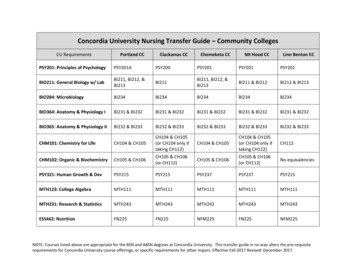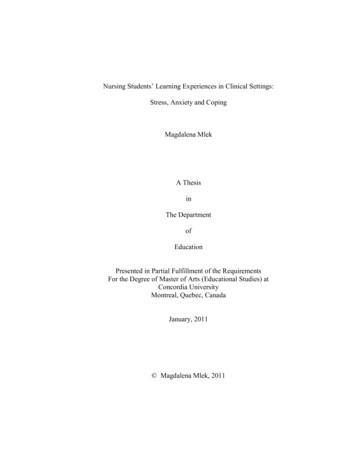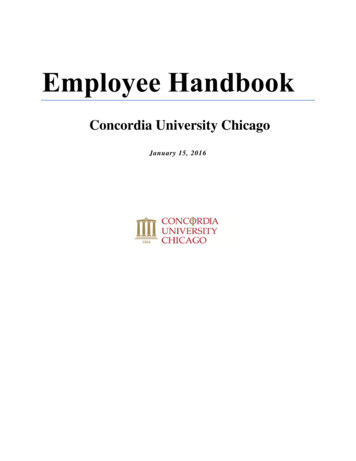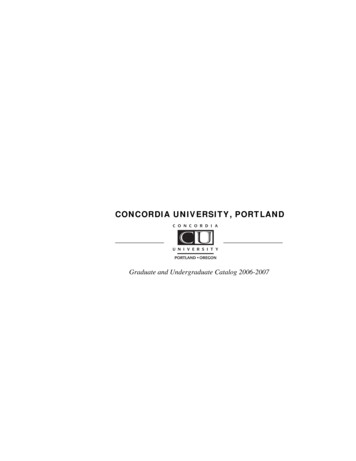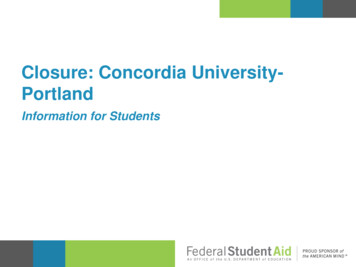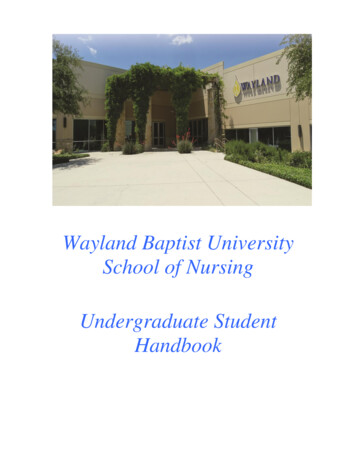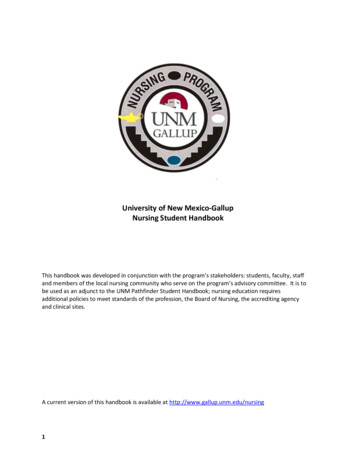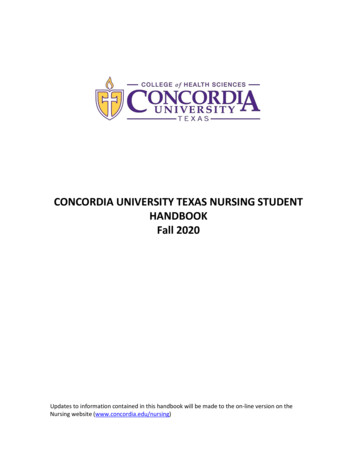
Transcription
-COLLEGE of HEALTH SCIENCES -w c 0 u I ,RIACONCORDIA UNIVERSITY TEXAS NURSING STUDENTHANDBOOKFall 2020Updates to information contained in this handbook will be made to the on-line version on theNursing website (www.concordia.edu/nursing)
-COLLEGE of HEALTH SCIENCES - C J ?f 1P Y 1AUndergraduate Nursing Student HandbookContentsIntroduction.4Mission of Concordia University Texas .4Mission of the BSN Program .4Goals of the Baccalaureate Nursing Program .4Expected Student Outcomes upon the completion of the BSN Program.5Professional Character .7Growing In Grace.7DRESS CODE POLICY .7UNIFORM .8NAME TAG .8SHOES.8SUPPLIES .8HAIR .8FINGERNAILS.8JEWELRY.8SMOKING .9Attendance and Tardiness Policies .9Laboratory and Clinical Practicum .9Medical Clearance for Return to Class .10Children on Campus or Concordia Site .10Cell Phone, Electronic Devices .10Social Media Guidelines .11Testing Policy for the College of Nursing .11Missed Exams.11Exam Honesty Statement .11Test Administration and Security .12Remote Testing.121
-COLLEGE of HEALTH SCIENCES - C J ?f 1P Y 1AUndergraduate Nursing Student HandbookDosage Calculation Proficiency Exams .13Exam Grades .13Exam Review.13Blackboard and Course Syllabi .14Academic Computers .14BSN Program Criminal Background Screening .14Castle Branch Account .15Drug Screening.15Professional Liability Insurance .15Health Insurance.16Universal Precautions .16Texas Board of Nursing Mental Health Requirements .16Physical Requirement for Nursing .16Special Health Problems .16Scholastic and Professional Integrity.16Forms of Academic Dishonesty .17Lying or Falsification of Documents Submitted to the College of Nursing.17Confidentiality.18Academic Evaluation.18Grading Scale for All Nursing Courses .18Incomplete.18Evaluation and Progression through the BSN Program.19Progression: .19Failing a Nursing Course: .19Failing a Nursing Skills Course:.19Co-Requisite Nursing Course .19Readmission:.20Dismissal from the College of Nursing .20Academic Appeal Process .20Safe Clinical Practice.212
-COLLEGE of HEALTH SCIENCES - C J ?f 1P Y 1AUndergraduate Nursing Student HandbookClinical Errors.22Nursing BSN Disciplinary Process .22Notice of Infraction .233
-COLLEGE of HEALTH SCIENCES - C J ?f 1P Y 1AUndergraduate Nursing Student HandbookIntroductionIt is important for students in the Concordia University Texas BSN program to understand themission and goals of the University and of the BSN program. The next few pages of the Handbookprovide this information.Mission of Concordia University TexasConcordia University Texas empowers students of all backgrounds to lead lives of critical thought,compassionate action and courageous leadership. As a liberal arts university rooted in theLutheran tradition and affiliated with the Lutheran Church-Missouri Synod, Concordia developsthe mind, heart, soul, and body, preparing leaders for lives of service.Mission of the BSN ProgramTo holistically educate baccalaureate and advanced practice nurses to deliver high quality, safenursing care to diverse populations utilizing critical thought, compassionate service, andcourageous leadership. This mission flows directly from the University’s mission.As a faith-based institution, Concordia is committed to service to improve the lives of all people asGod’s creation, and to respect all people as individuals of great intrinsic worth. The nursingprogram is strongly aligned with Concordia’s faith foundation because of the shared recognitionthat service to others encompasses not only individuals’ physical needs, but also their spiritual andemotional needs. The faith tradition of the University and the nursing program uphold themeaningfulness of service to others, respect for the inherent worth and dignity of all persons, andconcern for the needs of humankind. Concordia recognizes the essential contribution of theprofession of Nursing and is committed to an excellent BSN program to expand and further fulfillits mission. Graduates of Concordia’s BSN program, through their vocational areas in health care,will serve as leaders in promoting high-quality, safe patient/client care in diverse settings, basedon faith in God‘s love for all people and the desire to serve others as an expression of God’s love.Goals of the Baccalaureate Nursing ProgramThe goals of the baccalaureate nursing program are to: Provide a strong knowledge, skill, and attitude foundation for competent, evidence-basedprofessional practice in providing and coordinating care of patients/clients, families,groups, communities, and populations. Develop students’ abilities to serve as Christian leaders in professional nursing roles and tobe contributing members of the profession of nursing. Prepare students to function as change agents to improve the quality and safety ofhealthcare within dynamic, complex healthcare systems.4
-COLLEGE of HEALTH SCIENCES -GrJ c f f 1P Y 1AUndergraduate Nursing Student HandbookExpected Student Outcomes upon the completion of the BSN ProgramExpected Student OutcomesAs a Member of the Profession of Nursing, the BSN-graduate will:1. Function within the nurse’s legal scope of practice and in accordance with the policies and proceduresof the health care institution or practice setting.2. Assume responsibility and accountability for the quality of nursing care provided to patients, families,populations, and communities.3. Promote the practice of professional nursing through leadership activities, advocacy, influencinghealthcare policy formation and participation in the legislative process.4. Demonstrate responsibility for continued competence in nursing practice, and develop insight throughreflection, self-analysis, self-care, and lifelong learning.As a Provider of Patient-Centered Care, the BSN-graduate will5. Use clinical reasoning and knowledge based on the baccalaureate degree nursing program of study,evidence-based practice outcomes, and research studies as the basis for decision making andcomprehensive patient care.6. Assess the physical and mental health status, needs, and preferences of culturally, ethnically, andsocially diverse patients, families, populations, and communities based upon interpretation ofcomprehensive health assessment findings compared with evidence-based health data and a synthesis ofknowledge derived from a baccalaureate degree nursing program of study.7. Synthesize comprehensive assessment data to identify problems, formulate goals/ outcomes, anddevelop plans of care for patients, families, populations, and communities using information fromevidence-based practice and research in collaboration with members of the interdisciplinary health careteam.8. Provide safe, compassionate, comprehensive nursing care to patients, families, populations, andcommunities through a broad array of health care services.9. Implement the plan of care for patients, families, populations, and communities within legal, ethical,and regulatory parameters and in consideration of disease prevention, wellness, and promotion of healthylifestyles.10. Evaluate and report patient, family, population, and community outcomes and responses totherapeutic interventions in comparison with benchmarks from evidence-based practice and researchfindings, and plan follow-up nursing care.5
-COLLEGE of HEALTH SCIENCES -GrJ c f f 1P Y 1AUndergraduate Nursing Student Handbook11. Develop, implement, and evaluate teaching plans for patients, families, populations, and communitiesto address health promotion, maintenance, restoration, and population risk reduction.12. Coordinate human, information, and materiel management resources in providing care for patients,families, populations, and communities.As a Patient Safety Advocate, the BSN-graduate will13. Demonstrate knowledge of the Texas Nursing Practice Act and the Texas Board of Nursing Rules thatemphasize safety, as well as all federal, state, and local government and accreditation organization safetyrequirements and standards.14. Implement measures to promote quality and a safe environment for patients, self, and others.15. Formulate goals and outcomes using an evidence-based and theoretical analysis of available data toreduce patient and community risks.16. Obtain instruction, supervision, or training as needed when implementing nursing procedures orpractices.17. Comply with mandatory reporting requirements of the Texas Nursing Practice Act.18. Accept and make assignments and delegate tasks that take into consideration patient safety andorganizational policy.As a Member of the Health Care Team, the BSN-graduate will19. Coordinate, collaborate, and communicate with patients, families, populations, communities, and theinterdisciplinary health care team to plan, deliver, and evaluate care.6
-COLLEGE of HEALTH SCIENCES -GrJ c f f 1P Y 1AUndergraduate Nursing Student Handbook20. Serve as a health care advocate in monitoring and promoting quality and access to health care forpatients, families, populations, and communities.21. Use multiple referral resources for patients, families, populations, and communities, considering cost,confidentiality, effectiveness and efficiency of care, continuity and continuum of care, and healthpromotion, maintenance, and restoration.22. Communicate and collaborate in a timely manner with members of the interdisciplinary health careteam to promote and maintain optimal health status of patients, families, populations, and communities.23. Communicate and manage information using technology and informatics to support decision makingto improve patient care and delivery systems.24. Assign and/ or delegate nursing care to other members of the health care team based upon an analysisof patient or organizational need.25. Supervise nursing care provided by others for whom the nurse is responsible by using best practices ofmanagement, leadership, and evaluation.Professional CharacterStudents are expected to demonstrate a high degree of professional behavior in all activities andthe applicable regulations of the Texas Administrative Code and the mission of ConcordiaUniversity Texas. Professional character is evaluated throughout the program of study.Professional character includes, but is not limited to, behaviors indicating honesty, accountability,trustworthiness, reliability and integrity.Growing In GraceAs a Christian University that strives to develop Christian leaders, we expect and practice civility inthe nursing program. The expectation is that after graduation, the nurses from this program willcontinue to practice under this philosophy. The GROWING IN GRACE COVENANT is a tool to guidethem in the development of this professional behavior, incorporate into their philosophy ofprofessional nursing and bring to their future work environments.DRESS CODE POLICYStudents are expected to be in uniform and abide by the dress code policy and any additionalagency specific uniform policies. Students in violation of the nursing dress code may be dismissedfrom the clinical setting and/or lab with disciplinary process at the discretion of the faculty and7
-COLLEGE of HEALTH SCIENCES -GrJ c f f 1P Y 1AUndergraduate Nursing Student Handbookdirectors. Compliance with the dress code is a professional behavior and an expectation of allnursing students.UNIFORMThe accepted scrub brands are Cherokee Workwear or Dickies in grape – no other color isaccepted. The Concordia University Texas nursing student uniform consists of a purple scrub topwith the logo patch on the left upper arm and matching scrub pant. A long- or short-sleeved white,black, gray or navy-blue shirt or turtleneck may be worn under the scrub top. A purple ConcordiaFleece jacket purchased from the Concordia bookstore may be worn over the scrubs. No otherjacket or item may be worn over the scrubs. The uniform must be clean and wrinkle-free for eachwearing. Students cannot wear their Concordia uniform or badge(s) to any non-Concordia event,examples include shadow experience, training event(s) and/or volunteer event(s).Student Nurses Association approved t-shirts may be worn in the lab environment only. T-shirtsare not allowed in healthcare facilities.NAME TAGName tag(s) appropriate to the clinical agency, must be worn during all clinical experiences. Thename tag may be worn on a lanyard or a clip.SHOESShoes must be white, gray or black or combination thereof, closed toe and closed heel. Shoesmust be made of materials that do not allow fluids to pass through. Athletic shoes that meet theshoe requirements are permitted. All footwear must be clean, and shoelaces must be clean.Students are strongly urged to purchase a shoe that gives adequate support to the feet.SUPPLIESStudents must always have the following items with them while in the clinical and lab settings:stethoscope, permanent black ink pens, dry erase marker, penlight, bandage scissors, and a watchwith a second hand. Digital watches are acceptable if they have the capability of measuringseconds.HAIRHair must be clean and secured back from the face, off the shoulders. Hair should not fall in frontof the shoulders while in the clinical or lab areas. Headbands must be white, gray or black. Headscarves worn for religious reasons must be white, gray, or black. Facial hair must always be cleanand neatly trimmed and must not hinder the use of personal protective equipment.FINGERNAILSNails must be kept short and clean. Chipped nail polish, artificial nails, nail wraps, decorations, nailjewelry or other additions to natural nails are not allowed.JEWELRYJewelry must not be excessive in the clinical or lab environment. Earrings must fit snuggly againstthe ear lobe. No other jewelry or body piercing materials should be visible while in uniform.8
-COLLEGE of HEALTH SCIENCES -GrJ c
w_c_ - COLLEGE of HEALTH SCIENCES - 0_u _I ,RIA CONCORDIA UNIVERSITY TEXAS NURSING STUDENT HANDBOOK Fall 2020 Updates to information contained in

